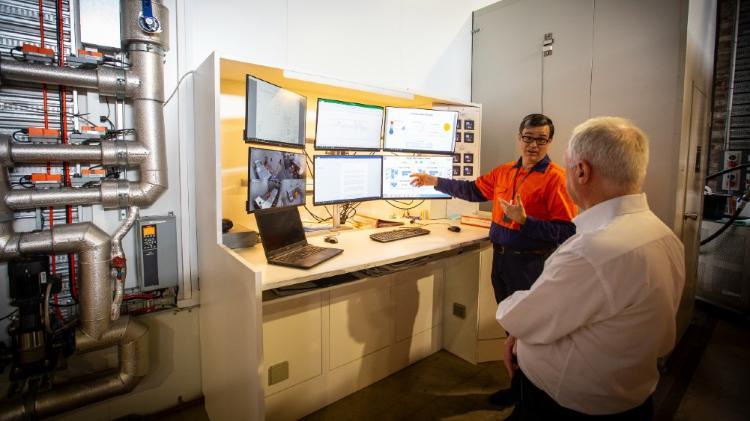The aim of the Sustainable Buildings Research Centre is to research, collaborate, and link with industry to meet the challenge of improving the performance of our new and existing building stock focused on making buildings more liveable, more sustainable, more cost-effective and kinder to our environment.
Research themes
- Energy: Sustainable and Efficient Utilisation, Generation and Storage
- Sustainable and Resilient Buildings: Construction, Performance, Retrofit, Precincts and Supply Chain
- Human Factors: Comfort, Health and Wellbeing
- Automation, Sensing and Control
- Modelling and Decision Support Systems
- Micro-grid (building scale or precinct scale)
- Ground source and air source heat pumps
- Phase Change Material (PCM) applications
- Photovoltaic-Thermal (PVT) systems
- Demand-side management and Distributed generation
- Energy informatics/intelligent built environment
- Net Zero Energy Buildings (NZEB)
- Prefabricated sustainable buildings
- Bushfire resilient buildings
- Housing for disaster recovery
- Retrofit for energy efficiency and thermal comfort
- Community response to natural disasters and heatwaves
- Urban heat island
- Green and cool roofs and walls
- Aged care accommodation
- Dementia friendly architecture
- Energy efficiency for low income households
- Indoor Environment Quality (IEQ)
- Thermal Comfort
- Heat and moisture transfer in buildings
- Building Management Systems (BMS)
- Predictive control
- Smart home systems
- Building information modelling
- Building energy modelling
- Cost benefit analysis
- Decision support systems
- Life cycle analysis
- Circular economy
Leading sustainable innovations
A world leader in energy-efficient building design, the Sustainable Buildings Research Centre (SBRC) is a living laboratory where researchers test and develop their own sustainability projects.
Find an expert Contact us
Research projects
Overview
The Innovation Hub for Affordable Heating and Cooling (i-Hub) is an initiative led by the Australian Institute of Refrigeration, Air Conditioning and Heating (AIRAH) in conjunction with CSIRO, Queensland University of Technology (QUT), the University of Melbourne and the University of Wollongong and supported by Australian Renewable Energy Agency (ARENA) to facilitate the heating, ventilation, air conditioning and refrigeration (HVAC&R) industry’s transition to a low emissions future, stimulate jobs growth, and showcase HVAC&R innovation in buildings. The objective of i-Hub is to support the broader HVAC&R industry with knowledge dissemination, skills-development and capacity building. By facilitating a collaborative approach to innovation, i-Hub brings together leading universities, researchers, consultants, building owners and equipment manufacturers to create a connected research and development community in Australia.
Warrigal Shell Cove i-Hub Living Laboratory
A ‘Living laboratory’ is a user-centred open-innovation, ecosystem within collaborative partnerships. The Warrigal Shell Cove i-Hub Living Laboratory establishes research-quality measurement and verification systems within an existing aged care facility, HVAC services and occupants in order to observe and evaluate technology upgrades within the context of the daily life of the aged care ecosystem. The technology upgrades trialled in this living laboratory will be selected from promising electric heating and cooling strategies that increase the energy flexibility of aged care facilities and deliver increased value for renewable energy, at the site and grid level.
Resources
Warrigal Shell Cove i-Hub Living Laboratory brochure (PDF: 1,976 KB)
i-Hub ACT Schools Living Laboratory
A ‘Living laboratory’ is a user-centred open-innovation, ecosystem within collaborative partnerships. The i-Hub ACT Schools living laboratory establishes research-quality measurement and verification systems within existing school buildings, HVAC services and occupants in order to observe and evaluate technology upgrades within the context of the daily life of these school ecosystems. The technology upgrades trialled in this living laboratory will be selected from promising electric heating and cooling strategies that increase the energy flexibility of ACT schools facilities, and deliver increased value for renewable energy, at the site and grid level.
Resources
Overview
At the University of Wollongong, a team of experts are participating in a unique project with the aim of targeting the gaps in the scientific understanding of bushfires.
Under the Global Challenges project, a multi-disciplinary team is bringing together specialists from social science, engineering and business to capture the complexity of bushfire events and how communities prepare for, respond to and recover from these destructive events.
In areas ranging from the physical interaction between fires and buildings, through to the social and societal factors that can help us build more bushfire-resilient communities, this project, along with other bushfire related work at UOW, will address the substantial hazard faced in Australia from these seasonal events.
Under the microscope
Two of our projects are examining some of the preventative measures people can take to mitigate the damage to property. In the shadow of the recent bushfire season, a project in the Kangaroo Valley is examining the potential retrofitting of houses, while research around the efficacy of sprinkler systems has been ongoing for several years.


